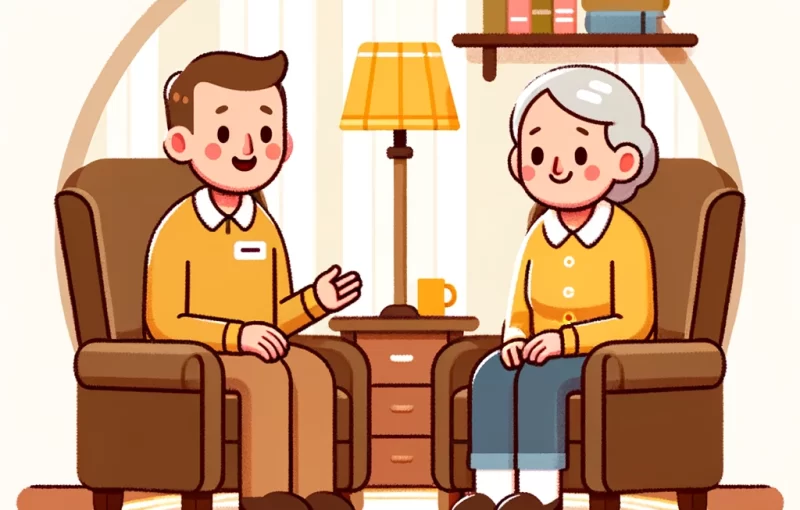
Friendly Visiting Programs: Easing Loneliness in Seniors
by Jon Scaccia June 4, 2024In today’s hyper-connected world, it’s hard to believe that millions of people suffer from loneliness and social isolation, particularly among older adults. Despite remaining in touch through various technologies, many still feel the void of meaningful human contact. A systematic review of friendly visiting programs reveals that these initiatives, aimed at reducing loneliness and improving well-being among older adults, could be an essential part of the solution. Let’s explore how these programs work and why they are significant in addressing this growing social issue.
Understanding Loneliness and Social Isolation:
Loneliness is a subjective feeling of lacking companionship, influenced by a mismatch between the relationships people have and those they desire. It can persist even if someone is surrounded by others.
Social isolation is the objective state of having few social connections or interactions. Factors like poor health, unemployment, or mobility issues can lead to isolation. Unlike loneliness, someone can be socially isolated without necessarily feeling lonely.
The Burden of Loneliness and Isolation:
Despite the perception of increased connectivity, studies highlight a rise in loneliness and isolation among older adults globally. In Europe alone, 7% of adults often feel lonely, while 18% report being socially isolated. As the world’s population ages, the prevalence of loneliness and isolation is expected to increase.
Health Impacts:
Research indicates that loneliness and isolation can have serious health implications. They can:
- Increase the risk of dementia.
- Have harmful effects equivalent to smoking 15 cigarettes daily.
- Lead to depression, lower life satisfaction, and other negative mental health outcomes.
Friendly Visiting Programs – How They Work:
Friendly visiting programs involve volunteers providing face-to-face companionship to older adults, often through casual conversations or shared activities like games or reminiscing. These programs generally aim to assist older adults living alone, with volunteers visiting those at risk of loneliness. Volunteers spend quality time talking, playing games, walking, or simply offering a listening ear to their assigned participants.
The Effectiveness of Friendly Visiting:
A systematic review of existing studies has shown varied results, largely due to the diversity of program designs and research methodologies:
- Loneliness Reduction: Some studies showed modest reductions in loneliness scores after regular friendly visits, but the results are not consistent across all studies.
- Improved Social Interaction: Participants often experienced an increase in social interactions, through more frequent phone calls, visits, and enhanced social networks.
- Positive Mental Health: Several programs have been linked to improved mood, well-being, and reduced depressive symptoms, highlighting the potential mental health benefits.
Limitations and Further Research Needs:
Many studies were limited in scope, often including only a small sample of participants. More research is needed to establish the long-term benefits of these programs. The majority of studies have been conducted in the U.S., leaving gaps in understanding the effects across different cultural contexts.
Discussion Questions (let us know in the comments!):
- How can we enhance the sustainability and scalability of friendly visiting programs in different cultural settings?
- What new strategies could be incorporated into these programs to address emerging challenges and diversify their impact?
Conclusion
Friendly visiting programs hold promise for alleviating loneliness and social isolation among older adults. Despite the mixed results, the potential for positive mental health impacts is clear. A more comprehensive approach to future research, program development, and global implementation can help ensure these programs are as effective and inclusive as possible.
Become a Health Innovator – Get Weekly Updates!
Join the forefront of public health innovation with “This Week in Public Health.” Each issue keeps you up-to-date with the latest in research, community health, and advocacy. This newsletter is more than just updates – it’s your tool for being an informed and active member of the health community. Subscribe for free and be part of a group dedicated to making a real difference in public health.
About the Author
Jon Scaccia, with a Ph.D. in clinical-community psychology and a research fellowship at the US Department of Health and Human Services with expertise in public health systems and quality programs. He specializes in implementing innovative, data-informed strategies to enhance community health and development. Jon helped develop the R=MC² readiness model, which aids organizations in effectively navigating change.
Leave a Reply